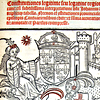
The First Part of the Institutes of the Lawes of England; or,
a Commentarie upon Littleton
London, 1628
As Attorney General beginning in 1594, Edward Coke was a strong defender of the crown and its prerogative powers. He was a ruthless prosecutor in the great treason trials of the early seventeenth century, including that of Sir Walter Raleigh and the conspirators in the Gunpowder Plot. With his appointment as Chief Justice of the Court of Common Pleas in 1606 he became the champion of the supremacy of the law over the King. His struggles with the King led to his dismissal from judicial office in 1616.
Coke's Institutes, as well as his Reports, firmly established the common law as the foundation for freedoms in England. The first part of the Institutes –Coke on Littleton –is the more famous. A long, rambling commentary, the book was nonetheless the principle text on the law of property until the mid-nineteenth century. Sir John Baker, prominent English legal historian, wrote of Coke's work:
He delighted in wandering off at tangents, and in doing so covered many aspects of the common law which Littleton's text never hinted at. Coke seems to have been oblivious to the disorder, but the reader can easily forgive him.
He wrote like a helpful old wizard, anxious to pass
on all his secrets before he died, but not quite sure
where to begin or end.
(Baker, Introduction to English Legal History, 3rd ed., 1990 at 218).
A nearly complete collection of all editions of Coke on Littleton, including the first, is held in the Rare Books Collection. Pictured is the third edition, printed in 1633.



![Abridgement of cases to the end of Henry VI [1460]](/_ui/img/treasures/img/thumbs/Picture2.png)





















